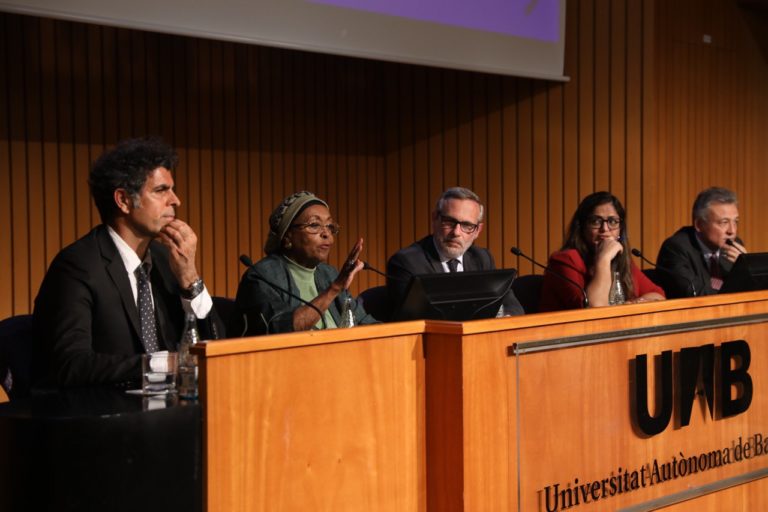
The Catalan National Assembly organised an event on self-determination and independence in the modernist Hospital de Sant Pau complex in Barcelona last week, that counted with the expertise of members of the UNPO and with dignitaries from around the world.
Last week, the UNPO (Unrepresented Nations and Peoples Organisation) held their General Assembly in Barcelona, hosted by the Catalan National Assembly. The Catalan pro-independence movement took the opportunity to assert itself as a political movement with an international network and influence.
Making the most of the presence of this international organisation in Barcelona, the Catalan National Assembly organised a roundtable on self-determination and independence, with more than a hundred people attending. The event comprised the expertise of UNPO members and dignitaries from around the world. Catalan politicians, renowned academics and members of non-governmental organisations attended the gathering.
The president of the Catalan National Assembly, Dolors Feliu, gave the welcome speech and thanked the speakers and the public for their participation, expressing that “Minorities need to stick together and show solidarity among each other. Every nation has its own particularities but the issues at stake are the same. It’s a matter of democracy, human rights, justice and freedom”.
The speakers on the round table were the Uyghur World Congress President Dolkun Isa, former Somaliland Foreign Affairs Minister and UNPO President Edna Adan, Sindh World Congress President and UNPO Vice-President Rubina Greenwood, and Taimoor Aliassi, a member of the Kurdish Human Rights Association – Geneva.
UNPO President Adan showed her gratitude for the invitation and stated that “A country can only be born once. Mine was the 12th independent African state, but the actual 42 African countries, many of those were still under colonial rule when we became independent, they nowadays don’t recognise us […] Somalia, which has been the cause of our destruction, has received the authority to represent us. We wonder where else in the world, the aggressor has been given the authority to represent the victim”.
The debate was chaired by Josep Alay, PhD in Sciences, Physics and Contemporary History, and Chief of Staff to President Carles Puigdemont. Moreover, think thank Catalonia Global Institute President Abel Riu and Editor-in-Chief Daniel Roldan presented their new report: Secessionist movements and internationalization strategies: a comparative study.
If you could not attend, you can watch the live streaming here.
On Friday and Saturday, UNPO continued its General Assembly and on Sunday 23rd April, some of its member took part in Sant Jordi, the Day of the Book and the Rose, one of the most important Catalan festivities.
The UNPO and the Catalan National Assembly
The Catalan National Assembly has been a member of the UNPO since 2018, as part of its strategy to internationalise the Catalan cause, the struggle for the right to self-determination and to denounce the Spanish state’s abuse against the pro-independence movement. The joint work with UNPO has been very successful, with the publication of the report Tools of Repression or the joint complaint to the UN Special Rapporteurs that triggered their communique that denounced the Catalangate espionage scandal and demanded explanations and reparations from Spain.
The UNPO is an international organisation whose goal is defending the right to self-determination of their more than forty members: indigenous peoples, minorities, unrecognised states and occupied territories. Besides Catalonia, there are other nations such as the Crimean Tatars, Biafra or Kabyle, among others.